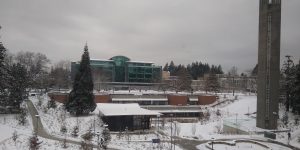It all started in September 2019, when I taught a Library Skills session with Evan Thornberry during my Co-Op term at Woodward Library. "GIS Librarianship is a thing? Wow!". After our session, I asked Evan for an Informational Interview, one of my Co-Op assignments.
On our talk, among several topics, we mentioned the Professional Experience in GIS Librarianship offered by the UBC Library - Research Commons in partnership with UBC School of Information, as a course (LIBR 596). I asked Evan if it would be possible to work with him on Summer 2020, and he said it would be possible and even better than the usual terms to hold professional experiences (Fall and Winter), because campus is not so crowded, librarians are not so overwhelmed... Oh, little did we know!
In March 2020 I reached out to Evan again so that we could design a plan for our Project, now facing a new challenge: a pandemic. Evan adapted our initial ideas in a way that I could still learn GIS, so, in May 2020 we ended up with the following expected outcomes for my Professional Experience:
- A Literature Review on GIS instruction at academic libraries
- A review and update of UBC Library Research Guides and Websites on GIS
- A training on GitHub
- A review and improvement of the digital GIS workshops offered by the Research Commons
In order to review and improve the workshops, website and Library Guides, I started with the literature review so that we could identify best practices in GIS instruction at academic libraries. With my research, I concluded that the literature in GIS Librarianship is in accordance with the client-centered approach that Librarianship is walking towards to, and that there is no perfect formula for GIS services at academic libraries because each Institution
has a different profile, as well as each patron has different needs. Thus, I focused on UBC GIS patrons: mainly students in Geography and Forestry.
For the sites and guides review and update part, I looked for and fixed broken links and typos, checked and improved the user experience (page usability) and the content accuracy and relevancy. I have reviewed and updated the following:
- Research Guides:
- Websites
Afterwards, I took a training in git and GitHub, which allowed me to work in accordance with the Research Commons workflow.
GitHub is a great platform for teams to work on, editing and creating content together. Developing skills in git and GitHub was a great outcome of my professional experience, and it allowed me to work with other Research Commons librarians.
On GitHub, I updated an unpublished GIS workshop that will soon be available at the Research Commons website. To improve the workshop usability, I took it as other patrons with no previous experience in GIS would. I asked Evan to provide more information on some key-concepts, and elaborated on the text that was already available, added more steps and explanations, took screenshots of the software and the proposed steps. By adding visuals to the content, we intend to better support patrons taking the course on a digital environment, with no synchronous instruction help.
As a bonus, I had the opportunity to work on online synchronous instruction, co-hosting some of the GIScience Workshop Series using Zoom. This opportunity gave me the tools to feel more confident about online teaching by managing chatrooms, individually contacting students to check if their doubts and issues were solved and helping the facilitator to manage the environment.
GIS are being used more and more in different research areas, which is why it is vital for libraries to provide geospatial data and GIS services, train staff and market GIS to Faculty and patrons. I'm glad I had the opportunity to start developing skills in GIS Librarianship, as I believe it to be a valuable asset for the data and academic library job market.

Learning Significance